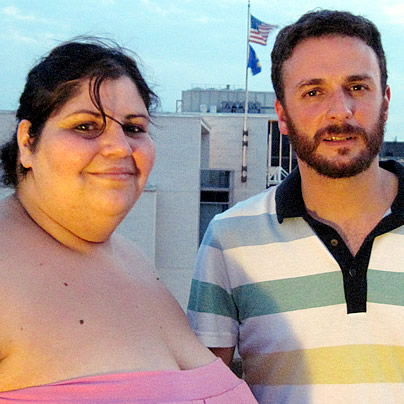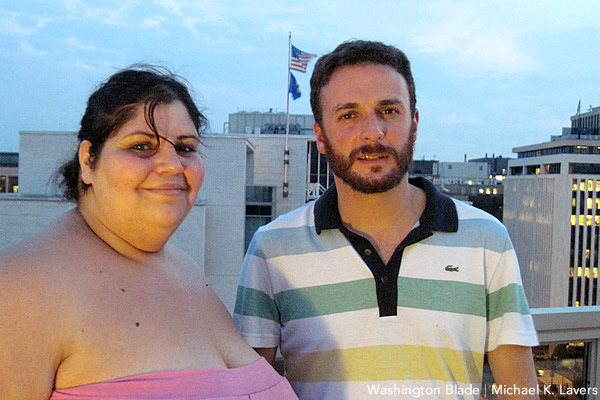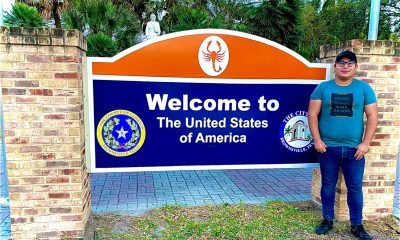National
Latin American LGBT activists visit the U.S. on State Department-sponsored trip
Nine Central and South American LGBT activists will remain in the country through Sept. 22


Laura Bronzino of Argentina and Jaime Parada in Chile in D.C. (Washington Blade photo by Michael K. Lavers)
Nine Latin American activists continue to tour the United States on a State Department-organized trip that is part of its ongoing efforts to promote human rights for LGBT people around the world.
Jaime Parada of the Movement for Homosexual Integration and Liberation in Chile; Laura Bronzino, president of the Misiones LGBT Association in Argentina; Henry Peralta, general director of the LGBT Equality Foundation in Bolivia; Marcela Sánchez, executive director of Colombia Diversa; Brazilian Congressman Jean de Matos; Francisco Madrigal of the Center for the Investigation and Promotion of Human Rights in Central America in Costa Rica; Efraín Soria, president of the Equity Foundation in Ecuador; José Lopéz, vice president of Comunidad Cultural de Tijuana LGBTI in México and Panamanian activist Augustín Rodríguez began their trip in D.C. on Sept. 4. They met with Human Rights Campaign staffers, former HRC President Elizabeth Birch, Council for Global Equality President Mark Bromley, transgender activist Dr. Dana Beyer and gay Maryland state Del. Luke Clippinger (D-Baltimore City,) representatives from the Justice Department, the Inter-American Commission on Human Rights and other federal agencies, human rights groups and non-governmental organizations while in the nation’s capital. The group also discussed the repeal of the military’s ban on openly gay and lesbian servicemembers at the Pentagon.
The activists met with staffers and representatives from the Gay and Lesbian Alliance Against Defamation, Harvey Milk High School, the American Civil Liberties Union, the New York City Anti-Violence Project and Gay Men’s Health Crisis while in the Big Apple from Sept. 8-12.
The group is scheduled to meet with representatives of the San Francisco LGBT Community Center, Equality California, the Transgender Law Center, the Gay-Straight Alliance Network and COLAGE while in the Bay Area from Sept. 12-16. Activists are also slated to meet with the University of Louisville’s Office of LGBT Services staffers and PFLAG members while in Kentucky from Sept. 16-19. And they are scheduled to meet with members of the Unity Coalition and Walker Burttschell, a former Marine infantryman who was discharged under “Don’t Ask, Don’t Tell” in 2003, in Miami before they leave the country on Sept. 22.
“I am tremendously happy for this experience that I will live,” said Parada in a press release his organization released before he arrived in the United States on Sept. 1. “It will be a big help in amplifying and perfecting my fight for the human rights of [Chile’s] sexual diversity. Without a doubt, the experiences and knowledge that I will gain will benefit sexual minorities.”
Latin American countries expand rights to LGBT citizens
Central and South American countries have also begun to expand rights to their LGBT citizens.
Same-sex couples in Mexico City have been able to marry and adopt children since 2010 — the Mexican Supreme Court ruled the same year that the country’s 31 other states must recognize them. Gays and lesbians have been able to enter into civil unions in the Mexican state of Coahuila since 2007.
Ecuador and Uruguay also allow civil unions for same-sex couples. Colombia also recognizes these relationships, but gays and lesbians will automatically receive full marriage rights in June 2013 if the country’s lawmakers do not act upon a court ruling that orders them to legislate the matter.
Argentine President Cristina Fernández signed her country’s same-sex marriage law in 2010, while neighboring Uruguay is widely expected to become the next Latin American country to allow gays and lesbians to tie the knot. São Paolo and several other Brazilian cities and states have recognized hundreds of same-sex civil unions in response to a 2011 ruling from the country’s Supreme Court.
Chilean President Sebastián Piñera pledged ahead of the country’s 2010 presidential election that he supports civil unions for same-sex couples. He introduced a civil unions measure last year, but it has stalled in the Chilean Congress.
“Marriage is uncertain,” Parada told the Blade. “It will undoubtedly be one of the most important points in the next presidential election, but it is very uncertain what will happen in that regard.”
Lawmakers pass transgender rights, anti-hate crimes bills
In addition to marriage, attitudes towards anti-LGBT discrimination and other issues in Latin America continue to change.
Piñera in July signed an LGBT-inclusive hate crimes and anti-discrimination bill that had languished for seven years. Chilean lawmakers passed the measure in response to four self-described neo-Nazis who allegedly beat Daniel Zamudio to death in a park in Santiago, the country’s capital, because he was gay.
Parada noted to the Blade that Santiaguïnos marched in the streets nearly every day to show their solidarity with Zamudio in the days and weeks after the brutal attack that left him in a coma. He ultimately succumbed to his injuries, but Parada noted the media coverage that surrounded Zamudio’s death highlighted efforts to combat anti-LGBT discrimination and violence in the country.
“It started a small ‘click’ in the people’s minds,” he said. “This case was an earthquake of a loss of a human life, but it was a point of inflection.”
In neighboring Argentina, Fernández in May signed a law that allows people who have not undergone sex-reassignment surgery to legally change their gender without a doctor or judge’s approval. It further mandates public and private health insurance plans to cover SRS, hormone therapy and other trans-specific treatments without additional premiums.
Bronzino, who is from northeastern Argentina near Iguazu Falls, acknowledged the same-sex marriage and gender identification laws to the Blade. She stressed that anti-LGBT police violence and discrimination remain problems.
Bronzino further noted that a lot of people have yet to benefit from these new legal protections.
“Equality has taken root in this country and the LGBT gender change,” she said. “But in Misiones they are not relevant. Only 15 equal marriages and 13 LGBT gender changes [have taken place.] That is not a large number of people.”
Activists: Trip proves Clinton’s commitment to global LGBT rights
The State Department did not return the Blade’s request for comment on the trip, but those who met with the activists applauded their efforts.
“They’re a great group of people who are all very active in their countries,” said Mónica Trasandes, GLAAD’s director of Spanish language media. “There is so much going on in Latin America now — Mexico and Central and Latin America. It’s wonderful and exciting to see that.”
“It was a pleasure to support the work of the State Department and all of the committed activists visiting the U.S. hoping to take lessons learned from our movement and apply them for positive change in their home countries,” added HRC spokesperson Michael Cole-Schwartz.
Beyer, who met with the activists in Annapolis after she returned from the Democratic National Convention in Charlotte, further described the trip as proof what she said is the former First Lady’s ongoing commitment to LGBT rights.
“Secretary Clinton came out and said LGBT rights are human rights and human rights are LGBT rights,” she told the Blade. “She wasn’t just talking. She’s made it real. This is an implementation of that policy of treating LGBT rights as human rights.”
Federal Government
Lambda Legal praises Biden-Harris administration’s finalized Title IX regulations
New rules to take effect Aug. 1

The Biden-Harris administration’s revised Title IX policy “protects LGBTQ+ students from discrimination and other abuse,” Lambda Legal said in a statement praising the U.S. Department of Education’s issuance of the final rule on Friday.
Slated to take effect on Aug. 1, the new regulations constitute an expansion of the 1972 Title IX civil rights law, which prohibits sex-based discrimination in education programs that receive federal funding.
Pursuant to the U.S. Supreme Court’s ruling in the landmark 2020 Bostock v. Clayton County case, the department’s revised policy clarifies that discrimination on the basis of sexual orientation and gender identity constitutes sex-based discrimination as defined under the law.
“These regulations make it crystal clear that everyone can access schools that are safe, welcoming and that respect their rights,” Education Secretary Miguel Cardona said during a call with reporters on Thursday.
While the new rule does not provide guidance on whether schools must allow transgender students to play on sports teams corresponding with their gender identity to comply with Title IX, the question is addressed in a separate rule proposed by the agency in April.
The administration’s new policy also reverses some Trump-era Title IX rules governing how schools must respond to reports of sexual harassment and sexual assault, which were widely seen as imbalanced in favor of the accused.
Jennifer Klein, the director of the White House Gender Policy Council, said during Thursday’s call that the department sought to strike a balance with respect to these issues, “reaffirming our longstanding commitment to fundamental fairness.”
“We applaud the Biden administration’s action to rescind the legally unsound, cruel, and dangerous sexual harassment and assault rule of the previous administration,” Lambda Legal Nonbinary and Transgender Rights Project Director Sasha Buchert said in the group’s statement on Friday.
“Today’s rule instead appropriately underscores that Title IX’s civil rights protections clearly cover LGBTQ+ students, as well as survivors and pregnant and parenting students across race and gender identity,” she said. “Schools must be places where students can learn and thrive free of harassment, discrimination, and other abuse.”
Michigan
Mich. Democrats spar over LGBTQ-inclusive hate crimes law
Lawmakers disagree on just what kind of statute to pass

Michigan could soon become the latest state to pass an LGBTQ-inclusive hate crime law, but the state’s Democratic lawmakers disagree on just what kind of law they should pass.
Currently, Michigan’s Ethnic Intimidation Act only offers limited protections to victims of crime motivated by their “race, color, religion, gender, or national origin.” Bills proposed by Democratic lawmakers expand the list to include “actual or perceived race, color, religion, gender, sexual orientation, gender identity or expression, ethnicity, physical or mental disability, age, national origin, or association or affiliation with any such individuals.”
Democratic Gov. Gretchen Whitmer and Attorney General Dana Nessel have both advocated for a hate crime law, but house and senate Democrats have each passed different hate crimes packages, and Nessel has blasted both as being too weak.
Under the house proposal that passed last year (House Bill 4474), a first offense would be punishable with a $2,000 fine, up to two years in prison, or both. Penalties double for a second offense, and if a gun or other dangerous weapons is involved, the maximum penalty is six years in prison and a fine of $7,500.
But that proposal stalled when it reached the senate, after far-right news outlets and Fox News reported misinformation that the bill only protected LGBTQ people and would make misgendering a trans person a crime. State Rep. Noah Arbit, the bill’s sponsor, was also made the subject of a recall effort, which ultimately failed.
Arbit submitted a new version of the bill (House Bill 5288) that added sections clarifying that misgendering a person, “intentionally or unintentionally” is not a hate crime, although the latest version (House Bill 5400) of the bill omits this language.
That bill has since stalled in a house committee, in part because the Democrats lost their house majority last November, when two Democratic representatives resigned after being elected mayors. The Democrats regained their house majority last night by winning two special elections.
Meanwhile, the senate passed a different package of hate crime bills sponsored by state Sen. Sylvia Santana (Senate Bill 600) in March that includes much lighter sentences, as well as a clause ensuring that misgendering a person is not a hate crime.
Under the senate bill, if the first offense is only a threat, it would be a misdemeanor punishable by one year in prison and up to $1,000 fine. A subsequent offense or first violent hate crime, including stalking, would be a felony that attracts double the punishment.
Multiple calls and emails from the Washington Blade to both Arbit and Santana requesting comment on the bills for this story went unanswered.
The attorney general’s office sent a statement to the Blade supporting stronger hate crime legislation.
“As a career prosecutor, [Nessel] has seen firsthand how the state’s weak Ethnic Intimidation Act (not updated since the late 1980’s) does not allow for meaningful law enforcement and court intervention before threats become violent and deadly, nor does it consider significant bases for bias. It is our hope that the legislature will pass robust, much-needed updates to this statute,” the statement says.
But Nessel, who has herself been the victim of racially motivated threats, has also blasted all of the bills presented by Democrats as not going far enough.
“Two years is nothing … Why not just give them a parking ticket?” Nessel told Bridge Michigan.
Nessel blames a bizarre alliance far-right and far-left forces that have doomed tougher laws.
“You have this confluence of forces on the far right … this insistence that the First Amendment protects this language, or that the Second Amendment protects the ability to possess firearms under almost any and all circumstances,” Nessel said. “But then you also have the far left that argues basically no one should go to jail or prison for any offense ever.”
The legislature did manage to pass an “institutional desecration” law last year that penalizes hate-motivated vandalism to churches, schools, museums, and community centers, and is LGBTQ-inclusive.
According to data from the U.S. Department of Justice, reported hate crime incidents have been skyrocketing, with attacks motivated by sexual orientation surging by 70 percent from 2020 to 2022, the last year for which data is available.
Twenty-two states, D.C., Puerto Rico, and the U.S. Virgin Islands have passed LGBTQ-inclusive hate crime laws. Another 11 states have hate crime laws that include protections for “sexual orientation” but not “gender identity.”
Michigan Democrats have advanced several key LGBTQ rights priorities since they took unified control of the legislature in 2023. A long-stalled comprehensive anti-discrimination law was passed last year, as did a conversion therapy ban. Last month the legislature updated family law to make surrogacy easier for all couples, including same-sex couples.
A bill to ban the “gay panic” defense has passed the state house and was due for a Senate committee hearing on Wednesday.
Indiana
Drag queen announces run for mayor of Ind. city
Branden Blaettne seeking Fort Wayne’s top office

In a Facebook post Tuesday, a local drag personality announced he was running for the office of mayor once held by the late Fort Wayne Mayor Tom Henry, who died last month just a few months into his fifth term.
Henry was recently diagnosed with late-stage stomach cancer and experienced an emergency that landed him in hospice care. He died shortly after.
WPTA, a local television station, reported that Fort Wayne resident Branden Blaettne, whose drag name is Della Licious, confirmed he filed paperwork to be one of the candidates seeking to finish out the fifth term of the late mayor.
Blaettner, who is a community organizer, told WPTA he doesn’t want to “get Fort Wayne back on track,” but rather keep the momentum started by Henry going while giving a platform to the disenfranchised groups in the community. Blaettner said he doesn’t think his local fame as a drag queen will hold him back.
“It’s easy to have a platform when you wear platform heels,” Blaettner told WPTA. “The status quo has left a lot of people out in the cold — both figuratively and literally,” Blaettner added.

The Indiana Capital Chronicle reported that state Rep. Phil GiaQuinta, who has led the Indiana House Democratic caucus since 2018, has added his name to a growing list of Fort Wayne politicos who want to be the city’s next mayor. A caucus of precinct committee persons will choose the new mayor.
According to the Fort Wayne Journal Gazette, the deadline for residents to file candidacy was 10:30 a.m. on Wednesday. A town hall with the candidates is scheduled for 6 p.m. on Thursday at Franklin School Park. The caucus is set for 10:30 a.m. on April 20 at the Lincoln Financial Event Center at Parkview Field.
At least six candidates so far have announced they will run in the caucus. They include Branden Blaettne, GiaQuinta, City Councilwoman Michelle Chambers, City Councilwoman Sharon Tucker, former city- and county-council candidate Palermo Galindo, and 2023 Democratic primary mayoral candidate Jorge Fernandez.
-

 District of Columbia2 days ago
District of Columbia2 days agoReenactment of first gay rights picket at White House draws interest of tourists
-

 District of Columbia2 days ago
District of Columbia2 days agoNew D.C. LGBTQ+ bar Crush set to open April 19
-

 Arizona2 days ago
Arizona2 days agoAriz. governor vetoes anti-transgender, Ten Commandments bill
-

 Africa4 days ago
Africa4 days agoUgandan activists appeal ruling that upheld Anti-Homosexuality Act











